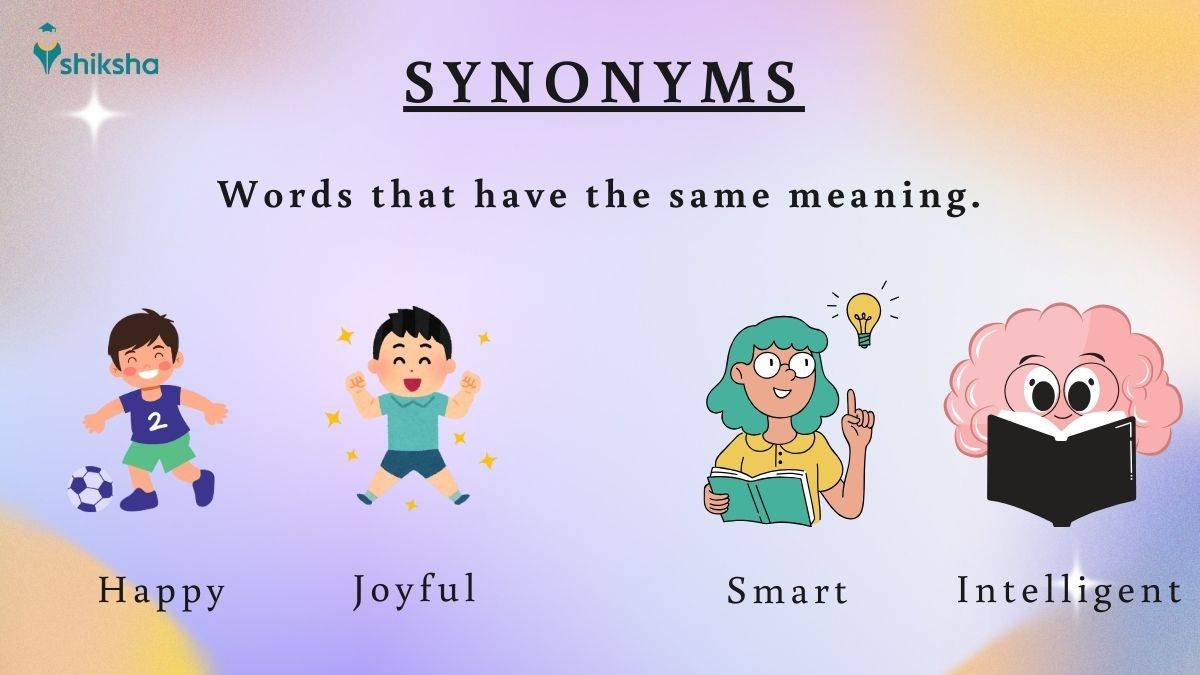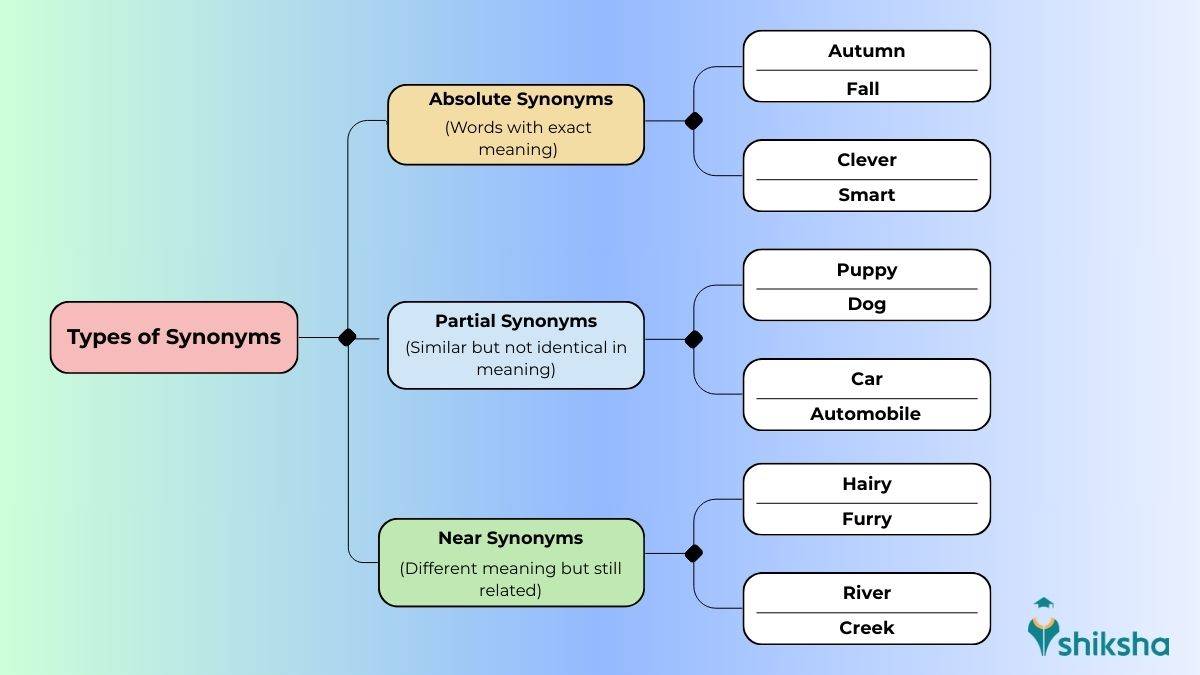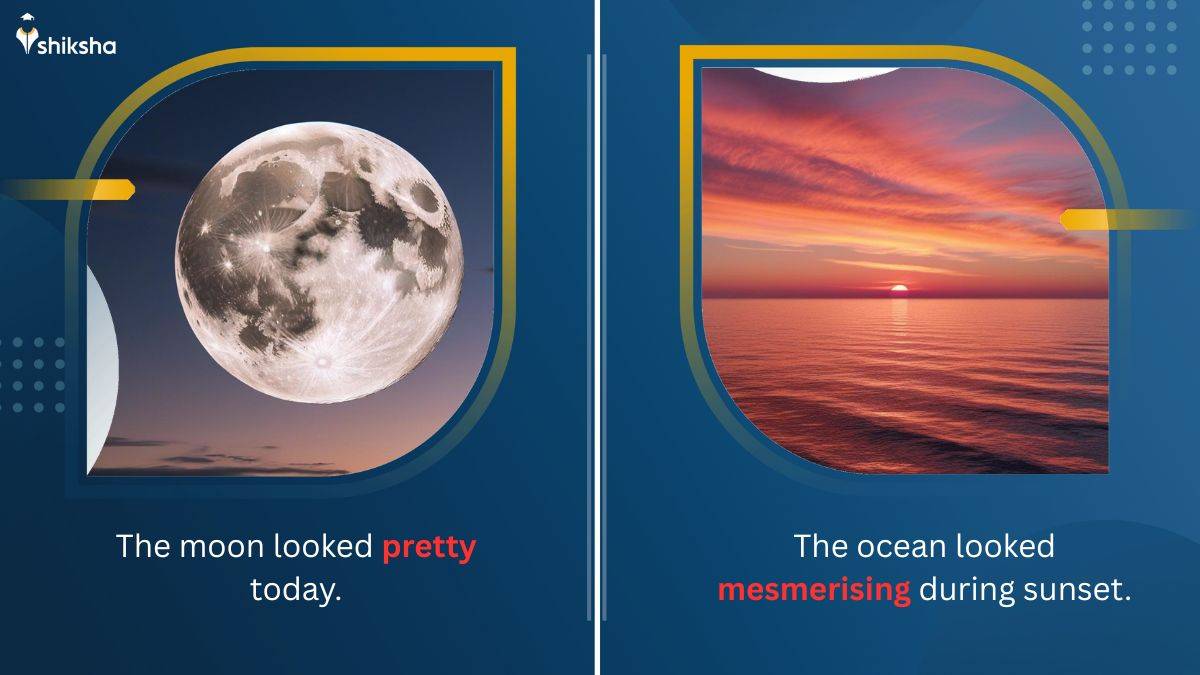
Words are often more than sounds and scribbles on a page or in a conversation. They’re also the tools we use in our day-to-day life to connect with others, to share our ideas and emotions. One such component of English that aids in refining our vocabulary is Synonyms. A good command of synonyms is useful for students, learners, and especially writers. By using synonyms of a word, one can avoid repetition while making the conversation more engaging.
By reading the following article, you can learn about the following topics:
- Types of synonyms in English grammar
- Synonym examples
- Synonyms of common words
What are synonyms in English?
Synonyms are words that either have the same or almost the same meaning as one another. Synonyms are used to avoid repetition of words while enhancing the sentence. There are three types of synonyms in English: absolute, near/ partial, and contextual. Some examples of synonyms are as follows:
- Synonyms of Happy: Joyful, Elated, Jolly
- Synonyms of Help: Aid, Assist, Support
- Synonyms of Quickly: Rapidly, Swiftly, Promptly
What are the types of synonyms?
There are three main types of synonyms: Absolute or Exact, Near, and Partial. Further, there are cases when synonyms might carry a similar meaning to only a certain extent. In such cases, one can’t use the words interchangeably without changing the meaning of the sentence. Certain words sound more formal as compared to their counterparts.
Example: Father is more formal than Dad.
Are synonyms and antonyms the same?
No, synonyms are words that have a similar meaning, whereas antonyms are used for words with the opposite meaning. Hence, no, synonyms and antonyms are not the same. Although the two often go hand in hand when talking about English grammar. Find below an example of synonym and antonym for each to understand it better:
Word | Synonym | Antonym |
|---|---|---|
Happy | Joyful | Sad |
Pamper | Indulge | Disparage |
- What are Synonyms?
- Definition of Synonyms in English
- Types of Synonyms in English
- What is the Importance of Synonyms
- Synonyms – Real Life Situations and Examples
- Tips to Master Synonyms
- Best Books for Synonyms in English Grammar
- Examples of Synonyms
- Synonyms and Antonyms: Know the Difference
- Related English Grammar Topics for Preparation
- Practice Questions for Synonyms in English
- FAQs on Synonyms in English
What are Synonyms?
In layman’s language, synonyms are words that either have the same or almost the same meaning as one another. One of the key purposes of using synonyms in a sentence is to avoid over-usage of a certain word while simultaneously improving how the overall sentence sounds. There are three types of synonyms in English: absolute, near/ partial, and contextual.
Some of the words might have multiple synonyms. One such example is happy. “Joyful”, “Cheerful”, and “Glad” are some of the commonly used synonyms for happy. All of these words denote a similar feeling and meaning.
Example: Preeti beckoned me towards her so that we could share our lunch together.
The word beckoned is a synonym for gesturing, waving, motioning, signaled, etc.
In simple terms, synonyms are words with a similar meaning.
Also Read:
Definition of Synonyms in English
As per the Oxford dictionary, synonyms are “a word or expression that has the same or nearly the same meaning as another in the same language”.
Further, as per the Collins Dictionary, synonyms are “a word that means the same or nearly the same as another word”.
Word Origin: late Middle English; via Latin from Greek sunōnumon, neuter (used as a noun) of the adjective sunōnumos, from sun (with) + onoma (name).
Pronunciation: /ˈsɪn.ə.nɪm/.
Types of Synonyms in English
Synonyms are broadly categorised into three types: Absolute or Exact, Partial and Near/ Contextual. Take a look at the types of synonyms used in English:
Absolute Synonyms
Also known as exact or perfect synonyms, these are words having the exact same meaning and can easily be used interchangeably without any change in the overall meaning.
| Absolute Synonyms | Use in a Sentence |
|---|---|
| Begin and Start |
|
| Mother and Mom |
|
In the sentences above, the general meaning is conveyed in the same manner, even with the usage of two different words. 'Mother' is more formal than 'mom'.
Partial Synonyms
Partial synonyms are words that carry a similar meaning but are not identical to one another. A few examples are listed below:
| Partial Synonyms | Use in a Sentence |
|---|---|
| Look and Glance |
|
| Cat and Kitten |
My cat is adorable My kitten is adorable. |
In the sentences above, looked is used in a more general and formal sense, however, glance (suggesting a brief look) is more nuanced and informal..
Near Synonyms
Unlike the partial synonyms, Near synonyms are words that have slightly different meanings (the difference could be due to degree or amount). But they are somewhat still related in meaning. However, near synonyms cannot be used interchangeably. Some examples of near synonyms in English are as follows:
| Near Synonyms | Use in a Sentence |
|---|---|
| Big and Gigantic |
While big can be used to describe a variety of things, ‘gigantic’ emphasises the size of something to a greater extent compared to simply using ‘big’ |
| End and Finish |
|
In the sentences above, cat and kitten are referring to the same animal, however, cat is more of a generic word compared to kitten.
You can check out the following flowchart to get a visual idea of the types of synonyms in English grammar and examples:
What is the Importance of Synonyms
Synonyms play an important role in our daily conversations. Although one can do without using many of them, they still add a flair both verbal conversations and literary front too. Let’s look at some key pointers on the importance of synonyms in the English language:
#1: Improved Communication
Instead of repeating the same word multiple times in a conversation, using words with a similar meaning and context will greatly improve a sentence.
Example: “The moon looked beautiful today. I looked at Rhea, who was standing near the seashore, and she was also looking beautiful. The sea also looked beautiful in moonlight.”
The sentence above has overused the words beautiful and also. This makes it monotonous and plain. We can improvise the sentence by using some of the synonyms of “beautiful” and “also”. Let’s take a look at the following sentence to understand this better;
“The moon looked beautiful today. I looked at Rhea, who was standing near the seashore, and she was looking heavenly as well. The sea too looked stunning in the moonlight.”
Heavenly and Stunning can both be used in place of ‘beautiful’; however, the context matters.
# 2: Synonym Provide Clarity
By using the correct word or its synonym, one can express their thoughts better. There are various synonyms which have a subtle difference in meaning and can greatly enhance a sentence.
Example: “My puppy is three weeks old.” Instead of “My dog is three weeks old.”
A puppy is a dog, too; however, using puppy in a sentence instantly specifies that it is still young. This gives an added imagery while reading or listening to the sentence.
Also Read:
| Nouns in English Grammar | Tenses in English Grammar |
Synonyms – Real Life Situations and Examples
We often come across situations in our day-to-day life where we either tend to use the synonyms ourselves or witness someone else using it in their conversations.
Shashi Tharoor is well-known for his penchant of using obscure words that most people have never heard of before in their lives. His vocabulary is filled to the brim with unique words and phrases. Find below few examples of synonyms to the words used by Mr. Tharoor:
“It’s clear you are not sesquipedalian, nor given to rodomontade. Your ideas are unembellished with tortuous convolutions and expressed without ostentation. I appreciate the limpid perspicacity of today’s column."
Let’s take a look at some common synonyms of all of the “obscure” words used above:
| Word |
Synonym |
|---|---|
| Sesquipedalian |
Pompous, Grandiose, Conceited, Showy, Snobbish, Flaunting, Inflated, Hollow |
| Rodomontade |
Boastful, Bragging, Bombast, Flatulence, Pretentiousness |
| Unembellished |
Plain, Simple, Stark, Subdued, Economical, Unadorned, Bleak |
| Tortuous |
Winding, Curved, Twisted, Sinuous, Crooked |
| Convolutions |
Complex, Intricate, Complicated |
| Ostentation |
Flamboyance, Pomp, Spectacle, Pretense, Flashiness, Exhibitionism |
| Limpid |
Clear, Transparent, Crystalline, Uncloudy, Comprehensible, Obvious, Transpicuous |
| Perspicacity |
Sharpness, Perception, Discernment, Wit, Intuition, Insight, Understanding |
As a bonus, the synonyms for “Obscure” are; Unclear, Unknown, Mysterious, Hidden, etc.
Tips to Master Synonyms
In the era of technology and the internet, looking up a synonym for a certain word is just a click away. Alternatively, you can also seek out more traditional methods, such as reading. Some best tips to learn synonyms in English are as follows:
Tip #1: Look up online to find more synonymous words. You can simply type out your query in Google or any AI platform.
Example: “Give me synonyms for happy.”
Tip #2: Checking out Thesaurus to find words with a similar meaning. You can either purchase a thesaurus or simply look it up online.
Tip #3: Playing online quizzes can help one gain more knowledge about words that share a similar meaning and can be used in a sentence.
Synonyms for Competitive Exams
Synonyms for one of the essential topics for competitive exams. These are an integral part of the comprehension passages, vocabulary, and other grammar-related sections of popular exams, such as IELTS, TOEFL, MAT, UPSC, SSC, and more. Find below a list of synonyms to prepare for competitive exams:
| Word | Synonyms |
|---|---|
| Abandon | Leave, Forsake, Quit, Relinquish |
| Ability | Skill, Talent, Competence, Aptitude |
| Achieve | Accomplish, Gain, Fulfil, Attain, Complete |
| Build | Construct, Design, Develop |
| Bright | Luminous, Radiant, Glowy, Shiny |
| Boring | Dull, Uninteresting, Tedious |
| Bizzare | Strange, Odd, Unusual, Peculiar |
| Brisk | Quick, Rapid, Swiftly |
| Change | Alter, Modify, Adjust, Convert |
| Choose | Select, Pick, Elect |
| Common | Usual, Familiar, Widespread |
| Crucial | Important, Vital, Significant |
| Dangerous | Risky, Perilous, Unsafe, Hazardous |
| Determine | Resolve, Settle, Decide |
| Elaborate | Explain, Clarify, Expound, Define |
| Endevour | Strive, Aspire |
Best Books for Synonyms in English Grammar
A good way to learn more about Synonyms is by going through books which contain a variety of examples. Some of the books that will help students are as follows:
| Book |
Author |
|---|---|
| Oxford Thesaurus of English |
Various Authors |
| Merriam-Webster Dictionary of Synonyms and Antonyms |
Merriam-Webster, Inc |
| The Synonym Finder |
J.L Rodale |
| Word Power Made Easy |
Norman Lewis |
You can find a variety of other such books in offline markets, online PDFs, and more.
Also Read:
Examples of Synonyms
Synonyms and Antonyms: Know the Difference
Related English Grammar Topics for Preparation
Practice Questions for Synonyms in English
FAQs on Synonyms in English
Commonly asked questions
What are some good books for synonyms?
Some good books for synonyms that will help students are as follows:
Book | Author |
|---|---|
Oxford Thesaurus of English | Various Authors |
Merriam-Webster Dictionary of Synonyms and Antonyms | Merriam-Webster, Inc |
The Synonym Finder | J.L Rodale |
Word Power Made Easy | Norman Lewis |
What are 10 examples of Synonyms?
Here's a list of 10 examples of synonyms:
- Synonyms of Happy: Joyful, Cheerful, Excited
- Synonyms of Small: Tiny, Miniature, Microscopic
- Synonyms of Big: Large, Huge, Immense
- Synonyms of Fast: Quick, Rapid, Swift
- Synonyms of Sad: Forlorn, Unhappy, Miserable
- Synonyms of Smart: Intelligent, Witty, Brainy
- Synonyms of Look: Glance, Peek, See
- Synonyms of Good: Fine, Excellent, Nice
- Synonyms of Calm: Serene, Tranquil, Peaceful
- Synonyms of Beautiful: Pretty, Gorgeous, Lovely
English Synonyms Exam
Student Forum
Other Topics under this Chapter
Other Class 10th English Chapters
- English Past Tense
- English Idioms
- English Punctuation
- English Analogy
- English Interjections
- English Prefixes
- English Adjectives
- English Future Continuous Tense
- English Letter Writing
- English Suffix
- English Grammar
- English One Word Substitution
- English Mood
- English Direct and Indirect Speech
- English Figures of Speech
- English Composition
- English Para Jumbles
- English Reading Comprehension
- English Sentences
- English Auxiliary and Modal Verbs
- English Formation of Words
- English Precis Writing
- English Nouns
- English Adverbs
- Conjunctions
- English Prepositions
- English Verbs
- English Paraphrasing
- English Articles
- English Subject and Predicate
- English Pronouns
- English Tenses
- English Active and Passive Voice
- English Vocabulary
- English Subject Verb Agreement
- English Phrases
- English Synonyms
- English Etymology and Roots
- English Spelling Rules
- English Parts of Speech
- English Gerunds



